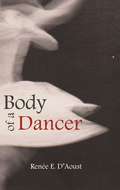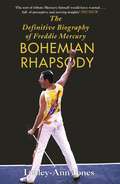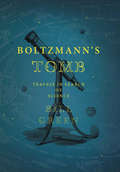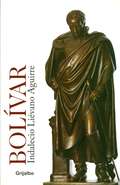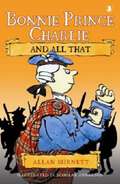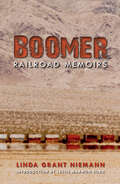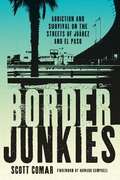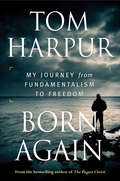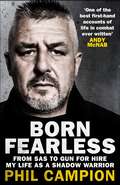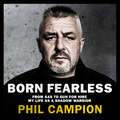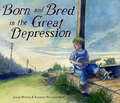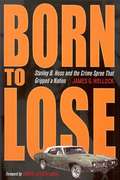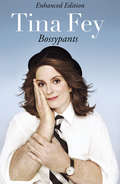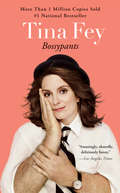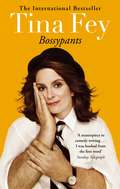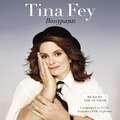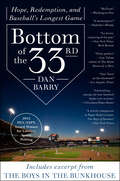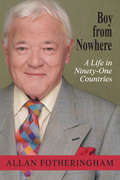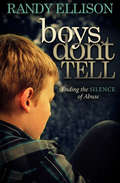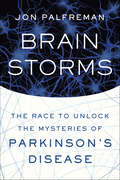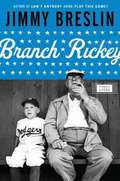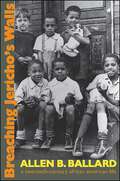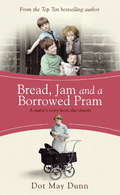- Table View
- List View
Body of a Dancer
by Renee D'Aoust"A remarkably clear-eyed descent into New York's surreal world of modern dance peopled by the obsessed, dispossessed, sexy, suicidal, brutal, broke, and absurd."-Lance Olsen, author of Nietzsche's KissesThe award-winning writer Renée E. D'Aoust draws from her experiences as a modern dancer in New York during the nineties. Her luminous prose spotlights this passionate, often brutal world. Trained at the prestigious Martha Graham Center, D'Aoust intertwines accounts of her own and other dancers' lives with essays on modern dance history. A dancer's body, scarred, strained, and tough, bears witness to the discipline demanded by the art form. Body of a Dancer provides a powerful, acidly comic record of what it is to love, and eventually leave, a life centered on dance."With exquisite description, absolute honesty, and a clear compelling voice, Body of a Dancer offers an unforgettable account of one artist's bittersweet journey."-Dinty W. MooreRenée E. D'Aoust's essays have been featured as notable essays in Best American Essays in 2006, 2007, and 2009. Her nonfiction work has been included in the anthology Reading Dance, edited by Robert Gottlieb and nominated for the Pushcart Prize. D'Aoust is the recipient of an NEA Dance Criticism fellowship and grants from The Puffin Foundation and the Idaho Commission on the Arts.
Bohemian Rhapsody: The Definitive Biography of Freddie Mercury
by Lesley-Ann Jones'Exactly the sort of tribute Mercury himself would have wanted' SPECTATOR'No one has captured better than Lesley-Ann Jones the magical, enchanting dualism of Freddie Mercury'THE TIMES'Truly definitive, truly Freddie, an energetic, entertaining and essential account'SIR TIM RICE'This book grabs you with its opening, then builds. Insight and anecdote in perfect harmony'SIMON NAPIER-BELL'At last a massive tribute to a massive talent'STEVE HARLEY, COCKNEY REBELThis is the definitive biography of Freddie Mercury. Written by an award-winning rock journalist, Lesley-Ann Jones toured widely with Queen forming lasting friendships with the band. Now, having secured access to the remaining band members and those who were closest to Freddie, from childhood to death, Lesley-Ann has written the most in depth account of one of music's best loved and most complex figures. Meticulously researched, sympathetic, unsensational, the book will focus on the period in the 1980s when Queen began to fragment, before their Live Aid performance put them back in the frame. In her journey to understand the man behind the legend, Lesley-Ann Jones has travelled from London to Zanzibar to India. Packed with exclusive interviews and told with the invaluable perspective that the twenty years since Mercury's death presents, Freddie Mercury is the most up to date portrait of a legendary man.
Bohemian Rhapsody: The Definitive Biography of Freddie Mercury
by Lesley-Ann Jones'Exactly the sort of tribute Mercury himself would have wanted' SPECTATOR'No one has captured better than Lesley-Ann Jones the magical, enchanting dualism of Freddie Mercury'THE TIMES'Truly definitive, truly Freddie, an energetic, entertaining and essential account'SIR TIM RICE'This book grabs you with its opening, then builds. Insight and anecdote in perfect harmony' SIMON NAPIER-BELL'At last a massive tribute to a massive talent'STEVE HARLEY, COCKNEY REBELThis is the definitive biography of Freddie Mercury. Written by an award-winning rock journalist, Lesley-Ann Jones toured widely with Queen forming lasting friendships with the band. Now, having secured access to the remaining band members and those who were closest to Freddie, from childhood to death, Lesley-Ann has written the most in depth account of one of music's best loved and most complex figures. Meticulously researched, sympathetic, unsensational, the book will focus on the period in the 1980s when Queen began to fragment, before their Live Aid performance put them back in the frame. In her journey to understand the man behind the legend, Lesley-Ann Jones has travelled from London to Zanzibar to India. Packed with exclusive interviews and told with the invaluable perspective that the twenty years since Mercury's death presents, Freddie Mercury is the most up to date portrait of a legendary man.
Boltzmann's Tomb
by Bill GreenA selection of the Scientific American book clubRecommended by MSNBC, Los Angeles Times, & American Association for the Advancement of Science's SB&F magazine"This wonderful scientific memoir captures the romance and beauty of research in precise poetic prose that is as gorgeous and evocative as anything written by Rilke, painted by Seurat, or played by Casals." -Mary Doria Russell, author of Doc and The Sparrow"A radiant love letter to science from a scientist with a poet's soul . . . Green is an exquisite writer, and his fierce focus and mastery of style are reminiscent of the biologist and essayist Lewis Thomas." -Kirkus ReviewsIn Boltzmann's Tomb, Bill Green interweaves the story of his own lifelong evolution as a scientist, and his work in the Antarctic, with a travelogue that is a personal and universal history of science. Like Richard Holmes' The Age of Wonder-this book serves as a marvelous introduction to the great figures of science. Along with lyrical meditations on the tragic life of Galileo, the wildly eccentric Tycho Brahe, and the visionary Sir Isaac Newton, Green's ruminations return throughout to the lesser-known figure of Ludwig Boltzmann. Using Boltzmann's theories of randomness and entropy as a larger metaphor for the unpredictable paths that our lives take, Green shows us that science, like art, is a lived adventure. Bill Green is a geochemist and professor emeritus at Miami University in Oxford, Ohio. He is also the author of Water, Ice & Stone: Science and Memory on the Antarctic Lakes which received the American Museum of Natural History's John Burroughs Award for Nature Writing, was a finalist for the PEN/Martha Albrand Award, and was excerpted in The Ends of the Earth: An Anthology of the Finest Writing on the Arctic and the Antarctic, edited by Elizabeth Kolbert.
Bolívar
by Indalecio Liévano AguirreLa más completa biografía del gran Libertador en las letras de uno delos mejores escritores de historia en Colombia. Atesorado como la mejor biografía del Libertador jamás escrita #y ya soninumerables-, este libro nos invita a mirar de cerca la intensa vida deun hombre excepcional, a la vez soldado, político, escritor, legisladory humanista. Sus épicas batallas, sus ideales, sus tormentosos romances,sus formidables enemigos y sus escasos amigos, su pensamiento, todo estáaquí narrado con impecable maestría. #La esclavitud es hija de las tinieblas, un pueblo ignorante es elinstrumento ciego de su propia destrucción
Bonnie Prince Charlie and All That (The And All That Series)
by Allan BurnettA real-life adventure &“packed with humor&” and historical facts about Britain&’s royal rebel! (The School Librarian) Join the dashing Prince on a dangerous mission to win back his three kingdoms from the horrible Hanoverians. Scramble ashore in the Scottish Highlands and find out how Charlie uses his funny wig and fancy French accent to convince the warlike clans to follow him. Gallop into action as the Prince&’s fierce Jacobite soldiers skewer his enemies and capture their castles. Find out where things start going wrong—and decide what you&’d do if you were Charlie. Learn how dressing up like a girl helps the Prince avoid being turned into sausages by Butcher Cumberland. Smell the crackling gunpowder as Charlie and his clans charge into a showdown with their foes at the battle of Culloden—and find out what happens after the guns fall silent. Stuffed with superb illustrations, this brilliant book brings history life—and will have kids bounding through the heather on an exciting escapade.
Boomer: Railroad Memoirs (Railroads Past and Present)
by Linda Grant Niemann“A fascinating mix of fact, history, self-confession, self-accusation, and self-forgiveness—a diary of both emotional relationships and travel.” —PasatiempoThis classic account of self-discovery and railroad life describes Linda Grant Niemann’s travels as an itinerant brakeman on the Southern Pacific. Boomer combines travelogue, Wild West adventure, sexual memoir, and closely observed ethnography. A Berkeley Ph.D., Niemann turned her back on academia and set out to master the craft of railroad brakeman, beginning a journey of sexual and subcultural exploration and traveling down a path toward recovery from alcoholism. In honest, clean prose, Niemann treks off the beaten path and into the forgotten places along the rail lines, finding true American characters with colorful pasts—and her true self as well.“Ma[kes] the railroad experience come alive with all its grit, danger, romance, and general outrageousness . . . Possibly the finest book I’ve ever read about the actual experience of working on the railroad.” —Trains Magazine“Niemann has a taut, lyrically restrained but vividly descriptive style, with an observational vigilance befitting a brakeman’s mindset, and her narrative clips along like a boxcar rolling through the yard.” —Bloom Magazine“A remarkable adventure tale, the occupational odyssey of the Ph.D. in literature who immerses herself in blue-collar America.” —Library Journal
Border Junkies
by Scott ComarThe drug war that has turned Juárez, Mexico, into a killing field that has claimed more than 7,000 lives since 2008 captures headlines almost daily. But few accounts go all the way down to the streets to investigate the lives of individual drug users. One of those users, Scott Comar, survived years of heroin addiction and failed attempts at detox and finally cleaned up in 2003. Now a graduate student at the University of Texas at El Paso in the history department’s borderlands doctoral program, Comar has written Border Junkies, a searingly honest account of his spiraling descent into heroin addiction, surrender, change, and recovery on the U. S. -Mexico border. Border Junkies is the first book ever written about the lifestyle of active addiction on the streets of Juárez. Comar vividly describes living between the disparate Mexican and American cultures and among the fellow junkies, drug dealers, hookers, coyote smugglers, thieves, and killers who were his friends and neighbors in addiction—and the social workers, missionaries, shelter workers, and doctors who tried to help him escape. With the perspective of his anthropological training, he shows how homelessness, poverty, and addiction all fuel the use of narcotics and the rise in their consumption on the streets of Juárez and contribute to the societal decay of this Mexican urban landscape. Comar also offers significant insights into the U. S. -Mexico borderland’s underground and peripheral economy and the ways in which the region’s inhabitants adapt to the local economic terrain.
Born Again: My Journey from Fundamentalism to Freedom
by Tom HarpurThe search for meaning in our time of change and upheaval continues unabated. Tom Harpur, the bestselling author of The Pagan Christ and Water Into Wine, has been at the forefront of this modern challenge to humankind’s spiritual identity. His radical and ground-breaking book The Pagan Christ touched the lives of thousands of seekers. With Born Again: My Journey from Fundamentalism to Freedom he tells us the story of his own search and the result is a compelling spiritual odyssey, the story of one man’s escape from the narrow grip of religious fundamentalism. Born into an Irish immigrant family in Toronto, Tom Harpur was groomed for the ministry by his father from an early age. He won a Rhodes Scholarship to Oxford, then returned to Canada and enrolled in Wycliffe College, the bastion of Anglican evangelicalism. Ordained to the ministry, Tom Harpur served for a number of years in his own parish before seeking a wider ministry in the world of mass media. In 1971, Tom Harpur joined the Toronto Star as the religion editor and over a number of years reported on and met many important figures from Pope John Paul and Mother Teresa to the Dali Lama, Jean Vanier, and Billy Graham. Here are fascinating anecdotes about these influential people and compelling accounts of the author’s travels around the globe. Perhaps Tom Harpur’s most intimate book, Born Again is a important work of spiritual insight, revelation and renewal.
Born Fearless: From Kids' Home to SAS to Pirate Hunter - My Life as a Shadow Warrior
by Phil Campion'Hard eyes stare out of massive beards, their faces marked by the scars of battle. With these guys their webbing looks like it belongs to them, rather than it's been hung on a pair of reluctant shoulders. There's not a word been said to us, but the ante has clearly been upped. There's a dark and sinister feeling in the air. It doesn't take a genius to figure it's about to kick off.' Former SAS soldier Big Phil Campion tells it like is in this brutally honest account of his insanely dangerous life as a private military operator. From playing chicken with a suicide bomber in backstreet Kabul, to taking on pirates with his bare hands, this is true-life action-packed drama at its best.
Born Fearless: From Kids' Home to SAS to Pirate Hunter - My Life as a Shadow Warrior
by Phil CampionThe explosive true story of a gun for hire.'Hard eyes stare out of massive beards, their faces marked by the scars of battle. With these guys their webbing looks like it belongs to them, rather than it's been hung on a pair of reluctant shoulders. There's not a word been said to us, but the ante has clearly been upped. There's a dark and sinister feeling in the air. It doesn't take a genius to figure it's about to kick off.' Former SAS soldier Big Phil Campion tells it like is in this brutally honest account of his insanely dangerous life as a private military operator. From playing chicken with a suicide bomber in backstreet Kabul, to taking on pirates with his bare hands, this is true-life action-packed drama at its best.(P) 2019 Quercus Editions Limited
Born and Bred in the Great Depression
by Jonah Winter Kimberly Bulcken RootEast Texas, the 1930s--the Great Depression. Award-winning author Jonah Winter's father grew up with seven siblings in a tiny house on the edge of town. In this picture book, Winter shares his family history in a lyrical text that is clear, honest, and utterly accessible to young readers, accompanied by Kimberly Bulcken Root's rich, gorgeous illustrations. Here is a celebration of family and of making do with what you have--a wonderful classroom book that's also perfect for children and parents to share.From the Hardcover edition.
Born to Lose: Stanley B. Hoss and the Crime Spree that Gripped a Nation
by James G. HollockStanley Barton Hoss was a burglar, thief, and local thug from the Pittsburgh area. In eight short months in 1969, however, he became a rapist, prison escapee, murderer, and kidnapper; the subject of an intense nationwide manhunt; and one of the FBI's Ten Most Wanted. In Born to Lose, author James G. Hollock traces Hoss from his earliest misdemeanors at the age of fourteen to a daring rooftop escape from the Allegheny Workhouse in Blawnox, Pennsylvania, where he was being held on a rape charge, to his killing of police officer Joseph Zanella in Oakmont, Pennsylvania, to his kidnapping near Cumberland, Maryland, and ultimate murder of Linda Peugeot and her two-year-old daughter Lori in the autumn of 1969. Their bodies have never been found. Although indicted for the Peugeot kidnappings, these charges were later dropped because it was determined his constitutional right to a speedy trial was denied. Hoss was, however, convicted of the murder of Officer Zanella and initially sentenced to death, and that sentence was subsequently commuted to life in prison. But his killings didn't end there. In December 1973, while incarcerated at Western Penitentiary, Hoss conspired with two fellow white inmates in the savage murder of the popular and well-respected corrections officer Lieutenant Walter Peterson, one of the first African Americans hired by the Pennsylvania prison system. As a result of this final homicide, Hoss was transferred to an isolation facility in Philadelphia where in 1978 he hanged himself. By consulting previously sealed state and federal archives and interviewing sixty individuals who witnessed or had significant knowledge of Hoss's series of felonies, James G. Hollock vividly re-creates the crimes, police dispatches, and court proceedings in this gripping narrative. He poignantly characterizes the players involved, especially those who suffered either directly or indirectly at the hands of Stanley B. Hoss.
Bossypants
by Tina FeyOnce in a generation a woman comes along who changes everything. Tina Fey is not that woman, but she met that woman once and acted weird around her.Before 30 Rock, Mean Girls and 'Sarah Palin', Tina Fey was just a young girl with a dream: a recurring stress dream that she was being chased through a local airport by her middle-school gym teacher. She also had a dream that one day she would be a comedian on TV. She has seen both these dreams come true.At last, Tina Fey's story can be told. From her youthful days as a vicious nerd to her tour of duty on Saturday Night Live; from her passionately halfhearted pursuit of physical beauty to her life as a mother eating things off the floor; from her one-sided college romance to her nearly fatal honeymoon - from the beginning of this paragraph to this final sentence.Tina Fey reveals all, and proves what we've all suspected: you're no one until someone calls you bossy.
Bossypants
by Tina FeyBefore Liz Lemon, before "Weekend Update," before "Sarah Palin," Tina Fey was just a young girl with a dream: a recurring stress dream that she was being chased through a local airport by her middle-school gym teacher. She also had a dream that one day she would be a comedian on TV.She has seen both these dreams come true.At last, Tina Fey's story can be told. From her youthful days as a vicious nerd to her tour of duty on Saturday Night Live; from her passionately halfhearted pursuit of physical beauty to her life as a mother eating things off the floor; from her one-sided college romance to her nearly fatal honeymoon -- from the beginning of this paragraph to this final sentence.Tina Fey reveals all, and proves what we've all suspected: you're no one until someone calls you bossy.(Includes Special, Never-Before-Solicited Opinions on Breastfeeding, Princesses, Photoshop, the Electoral Process, and Italian Rum Cake!)
Bossypants
by Tina FeyOnce in a generation a woman comes along who changes everything. Tina Fey is not that woman, but she met that woman once and acted weird around her.Before 30 Rock, Mean Girls and 'Sarah Palin', Tina Fey was just a young girl with a dream: a recurring stress dream that she was being chased through a local airport by her middle-school gym teacher. She also had a dream that one day she would be a comedian on TV. She has seen both these dreams come true.At last, Tina Fey's story can be told. From her youthful days as a vicious nerd to her tour of duty on Saturday Night Live; from her passionately halfhearted pursuit of physical beauty to her life as a mother eating things off the floor; from her one-sided college romance to her nearly fatal honeymoon - from the beginning of this paragraph to this final sentence.Tina Fey reveals all, and proves what we've all suspected: you're no one until someone calls you bossy.
Bossypants
by Tina FeyOnce in a generation a woman comes along who changes everything. Tina Fey is not that woman, but she met that woman once and acted weird around her.Before 30 Rock, Mean Girls and 'Sarah Palin', Tina Fey was just a young girl with a dream: a recurring stress dream that she was being chased through a local airport by her middle-school gym teacher. She also had a dream that one day she would be a comedian on TV. She has seen both these dreams come true.At last, Tina Fey's story can be told. From her youthful days as a vicious nerd to her tour of duty on Saturday Night Live; from her passionately halfhearted pursuit of physical beauty to her life as a mother eating things off the floor; from her one-sided college romance to her nearly fatal honeymoon - from the beginning of this paragraph to this final sentence.Tina Fey reveals all, and proves what we've all suspected: you're no one until someone calls you bossy.
Bottom of the 33rd: Hope and Redemption in Baseball's Longest Game
by Dan BarryIn “a worthy companion to . . . Boys of Summer,” a Pulitzer prize winning journalist “exploits the power of memory and nostalgia with literary grace” (New York Times).From award-winning New York Times columnist Dan Barry comes the beautifully recounted story of the longest game in baseball history—a tale celebrating not only the robust intensity of baseball, but the aspirational ideal epitomized by the hard-fighting players of the minor leagues.On April 18, 1981, a ball game sprang eternal. For eight hours, the night seemed to suspend a town and two teams between their collective pasts and futures, between their collective sorrows and joys—the shivering fans; their wives at home; the umpires; the batboys approaching manhood; the ejected manager, peering through a hole in the backstop; the sportswriters and broadcasters; and the players themselves—two destined for the Hall of Fame (Cal Ripken and Wade Boggs), the few to play only briefly or forgettably in the big leagues, and the many stuck in minor-league purgatory, duty bound and loyal forever to the game.With Bottom of the 33rd, Barry delivers a lyrical meditation on small-town lives, minor-league dreams, and the elements of time and community that conspired one fateful night to produce a baseball game seemingly without end. An unforgettable portrait of ambition and endurance, Bottom of the 33rd is the rare sports book that changes the way we perceive America’s pastime—and America’s past.“Destined to take its place among the classics of baseball literature.” —Kirkus Reviews (starred review)“Bottom of the 33rd is chaw-chewing, sunflower-spitting, pine tar proof that too much baseball is never enough.” —Jane Leavy, author of The Last Boy and Sandy Koufax
Boy from Nowhere: A Life in Ninety-One Countries
by Allan FotheringhamAs one of Canada’s pre-eminent newspaper and magazine journalists, Allan Fotheringham has met everybody from Bobby Kennedy and Pierre Trudeau to The Beatles and Nelson Mandela. Born in Hearne, Saskatchewan, in 1932, Allan Fotheringham has had a distinguished career. Dubbed "Dr. Foth," Fotheringhamgraduated from the University of British Columbia andhas worked for numerous news organizations, including the Vancouver Sun, Southam News, The Financial Post, Sun Media, the Globe and Mail, and most notably as a long-time columnist for Maclean’s.His career hastaken him to many places on almost every continent as a correspondent and allowed him to meet many renowned personalities, from Robert F. Kennedy, Ronald Reagan,and Brian Mulroney toThe Beatles, Pierre Trudeau, and Nelson Mandela.Forten years he was apanellist on the popular CBC-TV show Front Page Challenge, and he’s won many awards, includingthe National Magazine Award for Humour, a National Newspaper Award for Column Writing, and the Bruce Hutchinson Life Achievement Award.Time once described Allan Fotheringham as "Canada’s most consistently controversial newspaper columnist … a tangier critic of complacency has rarely appeared in a Canadian newspaper."
Boys Don't Tell: Ending the Silence of Abuse
by Randy Ellison&“[A] fiercely honest memoir . . . [a] difficult story of healing to help others find the strength to tell their own stories and heal themselves.&” —National Association of Adult Survivors of Child Abuse American society is in the midst of a crisis, an epidemic of violence, secrets, and shame. The victims reside in every town, on every street. Finding it easier to remain in denial than to confront this reality, the public minimizes the emotional aftermath of sexual abuse of children and provides few programs to help heal those afflicted. Recounting the author&’s journey through a minefield based on his own denial, Boys Don&’t Tell takes a subjective look back at a life distorted by the effects of child sexual abuse and offers insight as to why victims find it so difficult to &“just get over it and move on.&” Through the eyes and emotions of the author, it reveals his abuse as a teenager by a trusted minister and mentor, then recounts years of therapy, a formal complaint to the Church, and a lawsuit settled in mediation. Boys Don&’t Tell covers the nature of addictions, their impact, and the difficulty and reward in defeating them. Excruciatingly honest, it creates an openness that can facilitate healing in others. Boys Don&’t Tell gives voice to an estimated 20 million male survivors, and offers loved ones, professionals, church and organizational leaders the opportunity to understand the impact of child sexual abuse. &“Through his public speaking and advocacy work on behalf of survivors in Oregon and across the country, and through his book, Boys Don&’t Tell, Randy embodies the transformation of childhood trauma.&” —The Good Men Project
Brain Storms: The Race to Unlock the Mysteries of Parkinson's Disease
by Jon Palfreman“The best and clearest book I’ve encountered on the current state of knowledge about Parkinson’s Disease . . . a master storyteller.” —The Tampa TribuneSeven million people worldwide suffer from Parkinson’s, and doctors, researchers, and patients continue to hunt for a cure. In Brain Storms, Peabody Award–winning journalist Jon Palfreman tells their story—a story that became his own when he was diagnosed with the debilitating illness.Palfreman chronicles how scientists have worked to crack the mystery of what was once called the shaking palsy, from the earliest clinical descriptions of tremors, gait freezing, and micrographia to the cutting edge of neuroscience, and charts the victories and setbacks of a massive international effort to best the disease. He takes us back to the 1950s and the discovery of L-dopa. He delves into other therapeutic approaches to this perplexing condition, from partial lobotomies and deep brain stimulation to neural grafting. And he shares inspiring stories of brave individuals living with Parkinson’s, from a former professional ballet dancer who tricks her body to move freely again to a patient who cannot walk but astounds doctors when he rides a bicycle with no trouble at all.The race is on to stop or reverse neurodegenerative conditions like Parkinson’s and Alzheimer’s. Brain Storms is the long-overdue, riveting, and deeply personal story of that race, and a passionate, insightful look into the lives of those affected.“Well written and poignant.” —The Wall Street Journal“[Palfreman] has an excellent grasp on the science behind the disease . . . but it is as a human story that the book is most compelling.” —The Times Literary Supplement“Clean prose, clear thought and fascinating stories.” —The Miami Herald“Extraordinary case studies abound.” —Nature“Fast-paced, captivating . . . part scientific investigation, part medical detective story, and part memoir . . . it opens wide a window into the world of Parkinson’s.” —Publishers Weekly (starred review)
Branch Rickey
by Jimmy BreslinThe book that inspired Harrison Ford in his portrayal of Branch Rickey in the hit movie "42” In a brilliant match between author and subject, this latest addition to the Penguin Lives series features the inimitable Jimmy Breslin telling the rags-to-riches tale of Branch Rickey, the legendary manager of the Brooklyn Dodgers who integrated baseball by putting Jackie Robinson into the major leagues. Moving from the dusty Midwest towns where Rickey built baseball's farm system to the Brooklyn streets where he hatched his most famous plan, Breslin brilliantly captures the heady days when baseball became the national pastime. What emerges is the irresistible story of a schemer and redeemer, a great American who remade a sport-and dreamed of remaking a country. See Branch Rickey’s life brought to the screen in the hit movie "42” in theaters everywhere now. .
Breaching Jericho's Walls: A Twentieth-Century African American Life (Excelsior Editions)
by Allen B. BallardA rich narrative recounting the life story of award-winning African American historian and novelist Allen B. Ballard, Breaching Jericho's Walls takes its readers on an exciting journey from a segregated Philadelphia community in the 1930s to mid-century Paris, Moscow, Cambridge, and Manhattan. The author reflects on his own pioneering role as he expands his horizons, as one of the first African American students at Ohio's Kenyon College, studying abroad in France and sharing a café table with Richard Wright and James Baldwin, serving in the military in the American South and attending graduate school at Harvard University. Becoming one of the nation's first black Russian specialists, Ballard studies in post-Stalinist Russia for a year, where, among other adventures, he spends a month with Michael Gorbachev and his wife, Raisa, on a Soviet farm. Though he tells his own personal story within Breaching Jericho's Walls, Ballard also portrays the experiences of those northern African-Americans whose generations bridged the gap from the legacy of slavery to the breakdown of the segregated system in the 1950s and 1960s while revealing the crucial role that individuals like civil rights leader Paul Robeson, Olympic athletes Jesse Owens and Long John Woodruff, and scholar Alain Locke played in inspiring the hopes of an oppressed and downtrodden race. A memoir filled with entertaining anecdotes and insightful reflection, Breaching Jericho's Walls offers Ballard's compelling personal story and reveals how, brick by brick, African Americans built the road that led to the election of President Obama in 2008.
Bread, Jam and a Borrowed Pram: A Nurse's Story From the Streets
by Dot May DunnThe compelling and heartwarming story of a young nurse's life and work in 1950s England from the SUNDAY TIMES bestselling author."Three small children peep out, their eyes watching me from beneath tousled but clean hair. Their clothes seem to have been put on their bodies to cover them rather than to fit them, none wears shoes. Two older girls stand by a table, the only piece of furniture I have seen in the house, apart from a rickety pram, which now stands in the doorway. The crumbling remains of a loaf of bread are being coated with jam, and eager fingers await them..."It's the end of the 1950s and Britain is changing. The war's long shadow is fading and while the country gets ready for the swinging sixties, Dot is embarking on an adventure of her own. After qualifying as a midwife, young Dot has taken a job as a health visitor in the back streets of Birmingham. There, she's not just responsible for the babies brought into this world, but an army of toddlers, tykes and tots who all need a helping hand.For Dot it will be a heartrending journey - trying to help families with next to nothing, sharing the struggles of young mums and discovering how the spirit of the community can overcome the toughest of circumstances.
Bread, Jam and a Borrowed Pram: A Nurse's Story From the Streets
by Dot May DunnThe compelling and heartwarming story of a young nurse's life and work in 1950s England from the SUNDAY TIMES bestselling author."Three small children peep out, their eyes watching me from beneath tousled but clean hair. Their clothes seem to have been put on their bodies to cover them rather than to fit them, none wears shoes. Two older girls stand by a table, the only piece of furniture I have seen in the house, apart from a rickety pram, which now stands in the doorway. The crumbling remains of a loaf of bread are being coated with jam, and eager fingers await them..."It's the end of the 1950s and Britain is changing. The war's long shadow is fading and while the country gets ready for the swinging sixties, Dot is embarking on an adventure of her own. After qualifying as a midwife, young Dot has taken a job as a health visitor in the back streets of Birmingham. There, she's not just responsible for the babies brought into this world, but an army of toddlers, tykes and tots who all need a helping hand.For Dot it will be a heartrending journey - trying to help families with next to nothing, sharing the struggles of young mums and discovering how the spirit of the community can overcome the toughest of circumstances.
